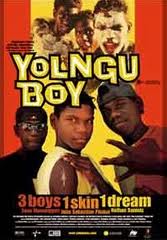
YOLNGU BOY
Australia, 2001, 87 minutes, Colour.
Sean Mungunggurr, John Sebastian Pilakui, Nathan Daniels.
Directed by Steven Johnson.
Yolgnu Boy was made under the auspices of the Yothu Yindi foundation in the Northern Territory and the Australian Children’s Film Foundation. It is filmed in beautiful territory, the Gove Peninsula, Arnhem Land coast. The three central children live on the coast but make their way through the rugged territory to Darwin.
The film takes up contemporary themes for aboriginal teenagers. However, it initially shows them in idyllic situations, young boys, swimming and fishing together, friends, and then undergoing their initiation rites. There is a transition to seeing them in their teenage years, one staying at home and keeping to the traditions, another keen on Australian rules football and wanting to get to Essendon, a third going to prison and being released.
The film shows the realities of 20th-21st-century living for teenagers, in the communities as well is in Darwin. The film does not shy away from portraying petrol sniffing, vandalising stores, the reality of prison. But it also advocates the initiation rites and the importance of these in the boys’ lives, in their transitions from childhood to adolescence, to the significance of the Dreaming, of the symbols, of the importance of the dancing and being in contact with the reality of the traditions.
The three boys portray the aborigines with conviction. They have some potential but are limited by their background, their treatment, conditions in the Northern Territory.
The film also shows the respect for the elders and their taking responsibility in trying to bring up the young men well. There is a glimpse of the Northern Territory police, a small cameo by Jack Thompson to give some cinema credibility to the film.
The film also shows how during the first years of the 21st century, indigenous filmmaking would develop both on screen and on television.
1. An Australian indigenous story? About children? For children? The aboriginal audience, aboriginal children, adults? Other Australians? International audiences?
2. Audience presuppositions, the Dreaming, aborigines and 20th-21st century life, the role of the traditions, in the modern world? Rituals, dancing, initiation ceremonies? Men’s business? The memories of initiation rites and their consequent effect? The 20th-century 21st-century world, modern music, commercialism, vandalism and stealing? Petrol sniffing? Sport? Prison life? The elders and their authority? The musical score?
3. The Northern Territory, its beauty, the Arnhem land coast, the towns and communities, Gove, the contrast with Darwin?
4. The introduction to the boys, the telling this story, their being introduced? The backgrounds, the young age, together, playing, swimming, fishing?
5. The time for initiation, the details of the ceremonies, the painting, the effect? The flashbacks to the ceremonies?
6. The boys in teenage, their lives, together, friendships? Differences? Lorrpu and his being at home? His leadership? Is memories? Millika and football, an easy life? Botz, his father, older, leadership? His sniffing the petrol and its effect? The vandalism and the exuberance of stealing? His carelessness with the fire, the burns, the injuries, hospital?
7. Botz, coming out, the injury to his arm, the danger for the police?
8. Lorrpu and his decision to go to Darwin, finding the boat, it capsizing, taking the radio and the modern music, the trip, the rowing, the stingray and its pulling the boat, seeing the turtle, capturing the turtle, the food? The difficulties, their clashes, the different visions for the future? Hopes? Hunting and painting, traversing the land?
9. The authorities, the white police, Jack Thompson in a cameo role? The aboriginal elders, the responsibilities, there guarantees, the search? The helicopter?
10. The young girl, flirting with Liverpool, leaving on the plane, the promise of the visit, his going to the school and her reaction?
11. Getting to Darwin, eating in the cafes, the clashes, new clothes, shopping? Botz going to find his father, his father not aware of his son, beating the
cigarette? Botz and his going to the wharf, sniffing the petrol, his death? The others finding him, the effect, grief? The elders and the funeral?
12. Aboriginal stories, the boys, their potential, conditions for life, favours and successes? The future?